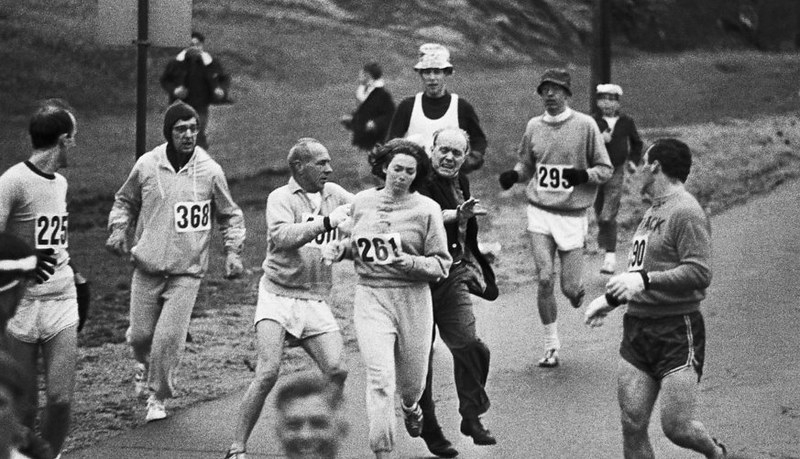This is a companion essay to Rosa’s set of interactive maps on the lesbian, queer and feminist sport and fitness culture of 1970s and 1980s Sydney.
On a freezing Massachusetts morning in 1967, nineteen-year-old Kathrine Switzer illegally entered, ran and finished the Boston Marathon, which was at that time a men-only race.
Switzer was studying journalism, and running ten miles a night. Like many women athletes in the late 1960s, she trained with the men’s team, because there was nothing on offer for her. Her coach often regaled the entire team with stories of success at Boston, which he had run fifteen times, until Switzer insisted that she was good enough to run the twenty-six miles. ‘No dame has ever run Boston,’ he would reply. But she chipped away at him until, eventually, they applied by post. In the application, she called herself ‘K. Switzer,’ de-gendering her name, and was assigned the number 261. The day of the race she pinned it on her top, and ‘carefully put on [her] makeup and gold earbobs.’ She rejected her teammates suggestion that she wipe off her lipstick, on the grounds that ‘someone might see you are a girl and not let you run.’
Lipsticked, she lined up with the men, in kit that today would make finishing a marathon seemingly impossible: floppy grey tracksuit and the simplest kind of shoe — flat, suede three-stripe Adidas, without cushioning, without waterproofing. Nothing technical. She recalled in her memoir Marathon Woman that she was warmly welcomed by the male runners around her. They asked her whether she might be able to get their wives into running.
Things went well until the 8-kilometre mark, when she heard a strange sound. The loud ‘scraping noise of leather shoes’ amidst thousands of rubber soles hitting the pavement. She turned, startled to find race official Jock Semple, fluorescent with rage. He grabbed Switzer by the shirt and screamed in her face ‘Get the hell out of my race and give me those numbers,’ trying to rip 261 from her chest. Switzer slightly wet her pants, at the‘ shock at how helpless I, as a strong woman, felt…’ against Semple’s ‘physical violence; the power was terrifying.’ Her coach and teammates managed to fight Semple off, and she completed the race in four hours, twenty minutes.
*
In the late 1970s, an anonymous sporty feminist discussed the Switzer race in the Sydney feminist periodical Girls’ Own. This a source I used extensively for my digital maps, which tells the story of Sydney feminist and lesbian sports culture across the 1970s. A runner herself, the author of the piece wondered why, in spite of Switzer proving women could do it once and for all, ‘relatively few women run,’ and even fewer ran long distances. She mused:
women do not run because they have heard that it is not good for them; that it breaks down fibres in their breasts and makes them sag…[They have been told that] females are not good for pursuing and breaking down prey, they are constructed for sitting on the nest.
She noted, ironically, that although women have always done physical work ‘in mines, mills, farms, offices and kitchens,’ they did not run because they have been told that ‘they wouldn’t be much good at it if they tried.’
But there was, she continued, an important psychological dimension:
we do not run because in this, as in other aspects of our lives, we have made the best of a bad situation we have finally fallen in love with it.
Women were afraid to run not because they feared they might fail, but because they were afraid they might be good at it. If women ran, they might have to give up ‘the vision of every woman as a special kind of invalid, deserving care, tenderness … in place of respect’ a vision which was imposed upon women but to which they, too, had grown attached.
The structural difficulties and barriers of the psyche faced by this writer and Switzer faced seemed truly from another time, as I worked on the map through the women’s World Cup, running five times a week myself. And what a world cup it was: from Matildas’ captain Sam Kerr’s goal against the Lionesses — a kick which proved to much even for England goalie Mary Earps — to Earps’ own save in the final against Spain.
I can measure how far we have come within my own family. Each week, my dad, his brothers and my grandad get together on a Friday night to watch sport. There are three TV screens, all set up next to the other, each showing a sporting event — two playing silently with subtitles, and the chosen most exciting game with sound. Usually AFL, cricket, rugby league, play beside each other (not union though because that is a rich man’s game). These days, women’s sport — in the form of the FIFA World Cup and the Ashes — makes it onto one of the three screens. Sometimes even the one played at full volume.
There has certainly been progress, but the struggles of the Spanish team must give us pause. Throughout the tournament the team was poorly managed by coach Jorge Vilda. He would force players to keep their hotel rooms unlocked before midnight, so he could carry out spot checks, and search the contents of the kit bags they took to training. Players complained of poor training facilities and sessions themselves that were not up to scratch, as well as Vilda’s lack of tactical analysis. If you are unsure of whether this is sexism, ask yourself: would David Beckham have been forced to train in poor facilities? Would Diego Maradona have been denied tactical support from his coach? Would Gareth Southgate ban Marcus Rashford from locking his door?
Things came to a head after the grand final. Spain was victorious. But during the celebrations, Spanish FA chief Luis Rubiales grabbed Jenni Hermoso and forcibly kissed her on the lips. She later called this act ‘sexist, out of place, and without any type of consent from my part.’ Rubiales accused Hermoso of engaging in ‘false feminism,’ and vowed to ‘fight until the end.’ The world watched as the top brass of the Spanish FA — all men — closed ranks. They released a statement where Hermoso called the kiss a ‘mutual show of affection.’ But the statement was fake.
This saga served as a reminder that even being the best in the world is not enough to protect you from male violence. Of course, privilege helps, but it is not enough. You might get lucky, or you might not — and many of us are not. Thanks to the determination shown by the Spanish team and the support of feminists globally, both Rubiales and Vilda were forced to resign.
The story of the Spanish team makes it clear just where the threat to women’s sport comes from, but right now there is a lot of confusion around this. I delved into this history, just as women’s sport became a major fault line for trans-exclusionary radical feminism and the far right, who have forged an alliance in an effort to stop trans women participating in women’s competitions, with much success. The argument is that trans women are ‘not real women’, that they pose a violent threat to women’s spaces, and that the rights of cisgender and transgender women’s rights are counterposed.
But history can help us here. By looking at the history of women in sport, we see how feminist and lesbian struggles to play sport in the past, resemble trans women’s today. Kathy Switzer is a cis-woman, but she was deemed by officials to be the wrong gender to participate. She was told she was in the wrong place, in the wrong body. When she mounted a challenge to the strict and rigid gender binaries imposed on us all, she was exposed, shamed and violently attacked. The women featured in the map faced bans, were forced off courts and fields and out of races. As feminists and lesbians they were charged with being ‘unnatural’ told they were ‘not real women.’ As Marion Stell and Heather Reid remind us in their fantastic Women in Boots: Football and Feminism in the 1970s, as women and girls demanded to play football in Australia, a panic over bathrooms ensued, coaches and officials asked: ‘where will the women get changed?’ Instead of building appropriate facilities where everyone could change with dignity, women and girls were told they could not play.
Like the women whose stories are told in the map, trans women today demand their right to play sport to feel good, and because they’re good, sometimes outstanding, athletes. This should be seen for what it is: the next step in the long struggle for gender equality in sport. As the writer in Girl’s Own identified, justice requires structural change, but it also requires a transformation in the psyche. Perhaps now, our task as women — whether trans or cis — is one of recognition. We must recognise ourselves in each other, our histories, our present, all of our lovely, sweaty faces reflected in the shiny trophy as we carry it high.
This digital map was first made and shown at the State Library of NSW Pride Revolutions Exhibition of 2023.




